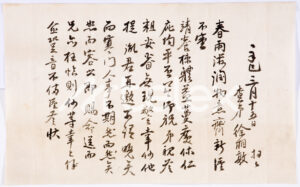Seo Sang-don (1851-1913) was an independence activist during the late Joseon dynasty and the early Japanese colonial period, who served as the Inspector of Gyeongsang Province and the Head of Finance for the Independence Club. He is best known for initiating the National Debt Repayment Movement. Born in Daegu, he was from a Catholic family, and his baptismal name was Augustine.
After facing hardships during the Byeongin Persecution in 1866, Seo Sang-don returned to Daegu in 1871, where he educated himself and started businesses in textiles and paper trading. By 1886, he had accumulated significant wealth and was appointed as an inspector of Gyeongsang Province by a special government order. Following his resignation from public office, he became a leading figure in Daegu’s business community and supported the development of the Catholic Church in the region.
Seo was also a prominent member of the Independence Club, actively participating in the resistance against foreign intervention. In 1907, at a meeting in Daegu, he proposed the National Debt Repayment Movement, which aimed to raise 13 million won to repay Korea’s national debt. He suggested that if 20 million people stopped smoking for three months and donated 20 jeon (Korean currency) each, the debt could be repaid. The funds raised from this movement would be used to restore national sovereignty.
The movement gained nationwide support, with newspapers such as *Hwangseong Shinmun*, *Daehan Maeil Shinbo*, and *Je-guk Sinmun* actively promoting it. However, the movement was eventually suppressed by the Japanese authorities. The funds that had been collected were later used for the National University Establishment Movement.
Although the National Debt Repayment Movement was ultimately unsuccessful, it became a symbol of the Korean people’s efforts to achieve independence. In recognition of Seo Sang-don’s contributions, he is remembered as a significant figure in Korea’s independence movement.

